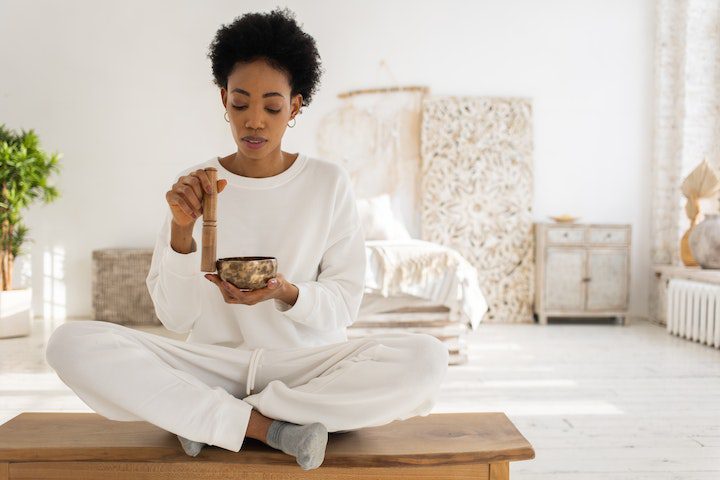
People often say, “I just can’t do meditation!” because they believe if they can’t sit cross-legged on a poofy cushion for hours on end, “they’re not doing it right.” Nothing could be further from the truth. Whether you’re a long-time practitioner or someone eager to expand your options, there are many ways to improve your ability to find regular peace in life.
Start With Mindfulness
Jon Kabat-Zinn once said, “It is indeed a radical act of love just to sit down and be quiet for a time by yourself.”
Physician, author, and professor Kabat-Zinn created mindfulness-based stress reduction (MBSR), a program first established at the University of Massachusetts Medical Center (now UMassMemorial Health) in 1979. Now known as the Center for Mindfulness, it’s one of the preeminent evidence-based programs for meditation and MBSR in the world.
Cultivating more mindfulness in your daily life is a terrific way to improve a meditation practice. It helps us to understand the simplicity in stillness. The key, Kabat-Zinn states in his book, Mindfulness for Beginners, is awareness, “cultivated by paying attention in a sustained and particular way: on purpose, in the present moment, and non-judgmentally.”
Even better, while we’re learning to expand possibilities in meditation, we can always take a moment for mindfulness. Let’s do that together right now:
- Open your mouth wide and fake a yawn. A couple of real ones might follow!
- While you yawn, open your arms wide, stretch your back, roll your hips to release tension, and exhale. This should last about 20 seconds or so.
- Now, observe how you feel. More clear-headed? Relaxed? More present? Yawning is thought to increase oxygen in the blood and activate an autonomic nervous system response.
Try more short mindfulness exercises from Mindfulnessbox and also from the book, How to Train a Wild Elephant, by Jan Chozen Bays.
Try a Different Meditation Style
The greatest misconception about meditation is there’s only one way and that way is the only right way. Thankfully, this isn’t even the slightest bit true.
Exploring various styles of meditation provides endless opportunities to improve your regular practice and help you discover other possibilities for different situations. Stuck in traffic? Choose a breathing meditation. Want to increase compassion for yourself and others? A loving kindness session might help. Trying to manage PTSD more effectively? Transcendental meditation could provide support.
Fortunately, we have a plethora of meditation resources available, both free and fee-based. Here are just a few:
- Popular apps for Apple and Android devices include Balance, breethe, Calm, Headspace, Insight Timer, and ZenFriend.
- Many organizations and individuals offer online options, too, such as The Chopra Center, Dr. Barbara Fredrickson’s Love 2.0, Free Mindfulness Project, Max Strom, Meditation Oasis, Tara Brach, and UCLA Health.
- Opportunities in our area to study with different guides include the Kadampa Meditation Center, the Transcendental Meditation Center, the Tucson Community Meditation Center, and the Tucson Shambhala Center.
Keep a Meditation Journal
Many people are delighted to settle into a few minutes of meditation, breathe a sigh of relief afterward, and move on with their day. Others prefer a more introspective approach, so a meditation journal might be just the thing to amplify the intent of your practice.
Making notes before and after a session helps refine how you view the present moment. You can reflect without judgment on how you feel, as well as how a particular meditation style or session affected you. Some people might also enjoy the act of putting pen to paper in a stream-of-consciousness way.
To expand your sense of meditation purpose, try these journaling prompts from The Good Body.
Consistency Means Everything
To feel as though you’re truly benefiting from meditation, aim for a more consistent practice. An article in Forbes Health points to detailed findings from dozens of studies about the compounded benefits of regular meditation including, but not limited to:
- Better management of anxiety, chronic pain, depression, and mood regulation
- Lessens the impact of stress and substance cravings
- Helps improve sleep habits, moderates blood pressure, and enhances the immune system
The Happiness Clinic lists many suggestions to improve your meditation routine. Here are just a few:
- Establish a regular time for practice, maybe even in the same place each time.
- Combine meditation with another wellness effort, such as yoga, an evening walk, or something else you do every day.
- Keep it simple—maybe just sitting quietly and feeling your breath pass throughout your body for 5 minutes is enough of a daily practice.
Holistic Wellness Matters at Cottonwood Tucson
When our mental, emotional, physical, and spiritual selves are all in balance, we know what it means to live authentically. For 35 years, Cottonwood Tucson has relied on this foundation to provide evidence-based treatment for mental health and substance use disorder. If this holistic approach matters to you, please talk to a member of our admissions team today.






